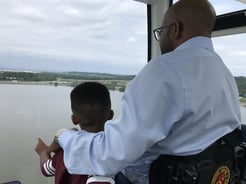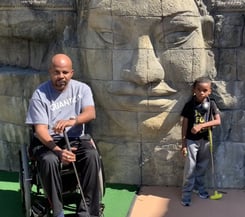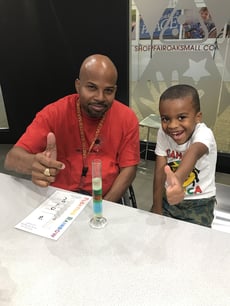COVID-19 One Year Later - Reeve Foundation
 Last March, as the coronavirus accelerated its spread throughout the country, Sherman Gillums, Jr. began thinking about a previous bout with pneumonia. Antibiotics helped, but it had been a hard illness and recovery for Gillums, who sustained a C6-C7 injury in a 2002 car accident. How much worse, he wondered, would the coronavirus be?
Last March, as the coronavirus accelerated its spread throughout the country, Sherman Gillums, Jr. began thinking about a previous bout with pneumonia. Antibiotics helped, but it had been a hard illness and recovery for Gillums, who sustained a C6-C7 injury in a 2002 car accident. How much worse, he wondered, would the coronavirus be?
"With pneumonia, I couldn't breathe," he says. "It was terrible. So, I began imagining pneumonia without the benefit of the medication. No cure, no vaccine. How could anyone survive that?"
Gillums and his wife quickly decided to shrink their family's footprint in the wider world. For the past year, they have seen his grown daughters in person only a handful of times, and those visits came with masks and social distance. Grocery trips remain limited to once a week, and they have homeschooled their 8-year-old son since the fall.
"I was worried about the potential impact as someone with a spinal cord injury," Gillums says. "As we began to hear about people dying, it really became a matter of survival."
 Families around the world have struggled to navigate the pandemic, whether worrying about lost jobs and monthly bills or trying to juggle work alongside virtual classrooms. For parents with disabilities, these challenges have been compounded by concerns about the coronavirus's heightened risk for people with secondary conditions.
Families around the world have struggled to navigate the pandemic, whether worrying about lost jobs and monthly bills or trying to juggle work alongside virtual classrooms. For parents with disabilities, these challenges have been compounded by concerns about the coronavirus's heightened risk for people with secondary conditions.
Geoff Krill, an adaptive coach for the Professional Ski Instructors of America (PSIA) and training director at New Hampshire's Loon Mountain, has led a healthy, active life since he sustained a T7-T8 injury in 1995. But he knew his reduced lung capacity could make the virus more dangerous if he caught it; to limit his exposure, his wife Heather took over the family shopping and errands.
"That was definitely a concern, how susceptible I was going to be to this," Krill says. "You just didn't know what was going to happen."
Navigating the upheaval of the first few months of the pandemic was the most challenging period for the family. Heather, a high school English teacher, was suddenly teaching from home, alongside the kids, ages, 9 and 11, who were also learning virtually. But Geoff's work shifted even more abruptly; instead of overseeing Loon's snow sports program during the week and traveling for PSIA clinics on the weekends, the lockdown ended his entire work season.
On one hand, it was a worrying financial blow, but Geoff —who Heather describes as "someone who only sees the positive"– managed to find the bright side in the extra time home.
"It was a strange thing for me—I've always had that 'go, go, go,'" he says. "But it was incredibly refreshing to spend that day-to-day time with my family."
Despite limited time with extended family and friends, the Krill family has tried to make the most of the past year, riding bikes, gathering around the firepit and building an accessible treehouse—all of which helped stave off stir-cray days.
"For us, the playful piece has been met for the kids," Krill says. "They have been a little affected socially, but not nearly as bad as people without a lot of outlets. We're fortunate to have more space around us."
 This fall, Heather and the kids returned to their classrooms, and Geoff is now back to work at Loon, although avoiding the lodge and crowded spaces. He received the second shot of the coronavirus vaccine in February —to the relief of his family.
This fall, Heather and the kids returned to their classrooms, and Geoff is now back to work at Loon, although avoiding the lodge and crowded spaces. He received the second shot of the coronavirus vaccine in February —to the relief of his family.
Sherman Gillums, Jr. has booked a vaccine appointment for this spring and is looking forward to an eventual "return to normal." Like Krill, Gillums described the extra time at home with his young son as a silver lining of the pandemic.
"It does feel like we made lemonade out of lemons," he says.
But the year also brought exactly what Gillums feared it might. In January, despite his precautions, he contracted the virus. It was as difficult as he imagined, but he says memories of the early days following his spinal cord injury helped him fight through the worst of the illness.
"It felt eerily similar to the experience of when I couldn't move when I was first injured," he says. "My experience in rehab informed the motivation I had to push against the fatigue and pain to get through it. A lot of people look at us like the most fragile of society, but our mettle is shaped by our rehab experience and makes us a lot stronger than people think."
Join Our Movement
What started as an idea has become a national movement. With your support, we can influence policy and inspire lasting change.
Become an Advocate